Jason Pettus's Blog, page 2
January 20, 2024
So how do you become a freelance book editor, anyway?
Originally published at the Jason Pettus newsletter through Substack on July 23, 2022, and republished here at this website on January 20, 2024.

Although the majority of the subscribers to this newsletter at the moment are authors, a sizeable minority are fellow editors and people who wish to eventually become ones themselves; so instead of offering my usual writing advice, in this issue I thought I'd talk a bit about how I came to become a full-time professional book editor. It involved some strange steps and some dicey days, but my story proves that it doesn't take anything fancy to first get involved, start immediately making money, and use those first profits to build up everything you need afterwards for traditional success.
In my case, the story started with two big failures in the late 2010s—both my small press running out of money and being forced to close, and my big expensive Mac finally biting the bullet and me not having the money to replace it. That had me on only a cheap $150 Chromebook at that point, with a sudden need to pivot financially, and not quite sure how to do so. So at first, I just tried doing as a freelancer what I had been doing professionally before opening my small press, which was office-oriented administrative tasks like being a virtual assistant, or editing memos and website copy. A freelancing website like Upwork.com doesn't require you to have any particular qualifications just to open an account, hang out your shingle, and start hustling for jobs; so that's exactly what I did, filling out my profile as honestly as I could and then just starting to throw myself into as many possible opportunities as I could find.
That's what freelancing is all about, learning to accept and then love all the constant daily hustle that goes into finding more work; you have to shift your mindset and understand that some of these administrative tasks are now part of your "job," and they come every day regardless of how little or how much actual paying work you're happening to be doing that day as well. Basically, clients post job opportunities at websites like Upwork, and then anyone who wants can submit a bid, explaining who they are and why the client should hire them and not the other applicants. So the way you present yourself and the way the client is looking for someone becomes this delicate balancing game; if you're just starting out and haven't built up a pubic reputation at Upwork yet, for example (shown very plainly on your profile whether you want it to or not), you might put in a lower bid in exchange for getting an early testimonial, while for jobs that require a more very specific set of skills that less people overall have, you might feel more comfortable putting in a larger bid but understanding that you may have to do a free sample as part of the interview process, and that it may take longer than normal for them to make a final decision.
For the first several years I was freelancing (part-time at that point, and wishing I could find more work than that), I was literally doing all my work on my $150 Chromebook, editing documents and doing other administrative work through the free online Google Docs, my only expense being the $15 a month I was paying Upwork to have a membership, plus of course the 20 percent of each job's pay they keep as their administrative fee. When I first started freelancing, I was kind of uptight about how large that figure is; but now that I've been freelancing a while, I realize that that fee is paying for an endless series of what in sales they call "hot leads," not just people likely to hire an editor but who specifically need one right that moment, and are literally going out and begging for someone to let them give them money. Hanging out your shingle in the big wide world of the entire internet makes it a lot harder to find these kinds of hot leads; so I've come to appreciate the appropriateness of Upwork keeping their cut as a "finder's fee" for bringing me and the client together. Of course, I didn't actually have to pay any of those fees until after the job was done and the money was earned; so you can see that for the first year or two I was freelancing, I was able to start making tens of thousands of dollars with just a beat-up little $150 Chromebook, free webapp software, and $15 a month to a lead-generation service like Upwork (or Fiverr, or Taskrabbit, or Reedsy, etc. etc.).
It was only a couple of years in, in fact, that I first heard a fellow freelancer tell me that there are actually tons of self-publishing writers out there who need the exact services I used to do for my authors for free as the owner of a small press, basically not just a thorough copy edit of the entire manuscript for what editors call GUPS (grammar, usage, punctuation and spelling), but also big-picture advice on characters, plot, pacing, style, genre tropes, how their universe is holding together, how publishable and commercially enticing it is, and all the other issues that go into publishing a contemporary book, which collectively is known as "developmental editing." If you were to take a pretty decently sized book, and get hired at the typical rate for both a developmental editing and copy editing of it, this person was telling me, you can pretty easily make a couple thousand dollars from just that project, and likely be done with it in just a couple of weeks.
And sure enough, when I looked into it, I discovered that all of this was indeed true, so that quickly and profoundly shifted the kind of freelance work I was both seeking and doing, and I "rebranded" myself at that point as exclusively an experienced veteran of developmental and copy editing for full-length books, who just happens to be able to do corporate editing like memos and website copy too. But what I quickly discovered is that I was only able to secure and then succeed at jobs in this because I had such big numbers behind me as far as experience; at that point I had already edited 40 full-length books over the last 15 years of my life, another 50 short books from the 15 years before that as a slam poet, basement-press employee and self-publisher. That's why my biggest piece of advice to beginning editors is always to go out and actually edit as many manuscripts as you can get your hands on, even if that's for free as favors for friends or by volunteering at a literary journal. There's nothing stopping you from building network connections during these free opportunities, so they're not exactly without any "profit," so to speak; but most importantly, doing it over and over and over within an actual commercial setting will simply teach you all the lessons about doing it right, and getting an intuitive sense of what isn't working in a big-picture way and how to fix it.
One thing to quickly establish is both your hourly rate and your "per word" rate, which is the more common way to express pay expectations in a lot of publishing and editing situations. For example, I could get a job here in Chicago at Whole Foods for $15 an hour (and in fact almost did, back right after my small press closed down), so I thought if I could average a pay rate of $20 an hour as a freelancer, it would officially beat out Whole Foods (or Starbucks for that matter) as something worth my time and effort. So I very carefully timed the first 10 or 20 full-length manuscripts I took on as an editor, and discovered that when they had a whole lot of mistakes, I could edit around 2,500 words per hour; and when they were relatively clean and easy to edit, I could edit around 6,000 to 7,000 words per hour. So if I want to guarantee $20 an hour even at my slowest speed, 2,500 words per hour, that would be a rate of 0.8 cents per word. So that's what I charged! So for a fairly hefty 100,000-word manuscript (like a lot of thrillers and also YA titles are), I earned $800 for a copy edit or developmental edit, $1,600 for both, and I could finish one in two weeks' worth of Mondays through Fridays; so if I could get to a point of never running out of these kinds of jobs, I could make $3,200 a month, way more than I ever made as the owner of a small press. And that's just at the slowest rate; if you mix in easy manuscripts too, that's more like $4,000 a month if you can maintain steady 40-hour-a-week work that never runs out.
Of course, now I started needing things like a standalone copy of Microsoft Word, so I could do all the "track changes" bells and whistles and deal with documents that were strangely sized and the like; and I needed a laptop with a beefier motherboard for the increasing amount of video chats I was having to do with clients. But of course I was making enough money at that point to easily afford now a mid-priced $500 HP Pavilion and $70 a year for Microsoft Office 365 (existing as standalone software for Windows and even now a fully robust online webapp version for Chromebook access on the go, which I have to admit is quite cool). But the trade-off for this additional investment is that starting around spring or summer last year, I started booking enough work to have that fabled 40 hours per week of editing to do, and by this most recent January was turning away enough work that I felt justified in experimenting with a 20 percent pay raise, to a full 1 cent per word for editing, and continued to book 40 hours of work per week even at that rate. Remember, that's $25 an hour just for the slowest, most error-filled manuscripts; for the ones that are pretty clean, I'm now often making up to $70 an hour for editing them, a rate I'm very happy with given that I'm only in year four of trying to freelance for a full-time living.
That's what these next steps are in my freelancing journey, like this free sporadic newsletter I share with a growing circle of clients, friends and fellow professionals; and that's why I recently decided to join the American Copy Editors Society, and go through the certification process they co-run with the Poynter Institute for Media Studies. I edit kind of intuitively at this point, often not knowing the formal rules for why something needs to be done, just naturally sensing that it does because of editing so many hundreds of books now (not just the 90 before becoming a freelancer, but the now 60 additional books I'm editing per year as a freelancer, now halfway through my third year of doing so, for a total of another 150 books now under my belt). But if I can learn the formal rules in a better way, I can take on things like academic papers and traditional journalism, for much higher pay rates since it's all being funded by some grant somewhere. Plus, it will be cool to say that I'm a card-carrying member of the American Copy Editors Society. Well, "cool." Cut a nerd a break.
All of that is coming in the months ahead, capped by finally getting my first-ever standalone website built out for my freelancing services, where you'll be able to book me through automated software just like you currently can at a place like Upwork. (Heads-up, fellow nerds: I'm thinking of creating a smart contract through Ethereum that would work like Upwork's current system, where the money is paid in advance and held in escrow, not released until the client confirms that the work was received and done well.) But in the meanwhile, you continue to be able to hire me exactly the way people have been able to for the last twenty years now, by directly writing to me at ilikejason@gmail.com and letting me know of your interest. As you can see, you can get started as a freelancer with almost nothing but sweat equity (lots and lots of sweat equity), then use the profits of those early jobs fund the additional access and tech you need to eventually grow to a professional full-time level.
This Week's Reviews: JACK DAMN REACHER EditionIt's been another busy few weeks over at Goodreads since my last update. New book reviews to check out include:
The brand-new Tracy Flick Can't Win, the 30-years-later sequel to Election by Tom Perrotta, which I read and enjoyed so much that I went back and read the original Election again as well, which I equally enjoyed the second time.
The latest by the "queen of the summer beach read," The Hotel Nantucket by Elin Hilderbrand, which of course I loved just as much as my other guilty summer reads of hers.
And speaking of guilty annual summer reads: REACHER! JACK DAMN REACHER!!!
Three new slim wellness books, two of which were only so-so (Annabel Streets' 52 Ways to Walk and Thich Nhat Hanh's How to Eat), and one great but only if you're a meditation beginner (Robert Schachter's Mindfulness for Stress Management).
And last and best, Bridget Collins' hard-to-categorize but mesmerizingly dense and poetic New Weird saga The Betrayals, which...uh, takes a lot of unpacking.
And what's going on with YOUR book?I've got a number of freelance clients right now who are in the last stages of production for their books, and soon will have great things to share here about new titles now available for public consumption at Amazon, Audible, independent bookstores and your local library. Do you have such news to share as well? Let me know at ilikejason@gmail.com, so I can share it here! We're a growing international community of self-publishing authors, indie-press owners, and fellow publishing professionals discussing ideas through this newsletter, and I always love sharing both good news and interesting business plans for how people achieved this good news, especially when it can be directly applicable to another self-publisher's situation. I wish you much luck with your own book, whatever stage of completion it's currently in, and I look forward to speaking with you all again next time.
An Aussie client's New Weird book gets a second life; lots of books I've recently hated; and Seriously, The Very Last Guide To Writing A Query Letter You'll Ever Need, SERIOUSLY.
Originally published at the Jason Pettus newsletter through Substack on June 30, 2022, and republished here at this website on January 20, 2024.
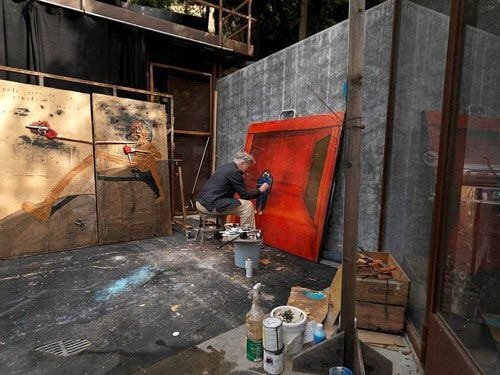
David Lynch and a big scary box, just two of the elements of Dave Neuman’s Kaleidoscopic Shades
The Curious Second Life of "Kaleidoscopic Shades"So I heard recently from a writer I worked with last year named David A. Neuman. A while back, he published a sorta...New Weird, I guess? (we'll get to that) novel called Kaleidoscopic Shades—Within Black Eternity, but unfortunately not much happened with it; some publicity was sent out, no one really bit, there was not much media interest, and it just never ended up selling many copies nor getting much notice over at Goodreads. But recently things had started turning, and it was great to hear the details about it from him recently while I was checking in on the status of his second novel, which he's in the process of writing.
First, he was finally able to get the book into the hands of the right reviewers, who could appreciate its extra-long length, its experimental nature, and its flip-flopping back and forth between many different genres; and that got him eventually on the highly popular podcast The Constant Reader—The Canon of Stephen King, because like the Netflix hit Stranger Things, one of the genres of Neuman's is also King pastiche, but in his case only if you mix it equally with the darkly surreal vision of David Lynch, then throw in a fair amount of the Hellraiser movies for good measure. He was telling me that he was then supplementing this with some Amazon Ads, one of the only places where he was actually spending money, and also paying for sponsored tweet campaigns.
The results? Well, it's reached #137 on the bestseller list for time travel novels amongst the entire country of Australia at Amazon, so that's impressive! It's also getting notice from some bigger organizations like Reedsy, and all of this has finally started bringing in the large amount of Goodreads reviews that he'd been hoping for all this time. This shows us the same thing that we saw with another one of my clients a few months ago, Jacob Moon and his race-aware horror/crime novel Dead Reckoning; that a combination of a lot of free labor ("sweat equity") combined with a little bit of very smart spending can often get you big results, but that you actually need both those parts added together, in that you can never do just free labor and still get the big oomph in audience size and national exposure that a $2,000 campaign at Amazon or Goodreads or Audible will boost you to. And of course simply spending money while otherwise phoning it in will never get you a big success either, not ever, let Bloomberg's Presidential campaign always be a humbling reminder of that, Amen.
By the way, this is one of the few times I get to actually publicly mention a book I’ve worked on through the publishing services company Gatekeeper Press. I’ve been working with this company steadily for the last two and a half years, and I can strongly recommend them for self-publishers who may not want to go to all the trouble of finding and booking the five to six freelancers they need to take their book from a Word document to a finished paperback in their hands. They can instead go to Gatekeeper, pay a retail fee for it all (i.e. a little more expensive than hiring each of us on our own), and get their own dedicated project manager who keeps all these crazy amounts of wheels in motion and organized together.
I love working for them—everyone over there is great, and they’ve really gone out of their way a lot of times over there to help me out, a standup company with a standup staff who give everyone what they deserve for the (admittedly) high fee you’re paying there, for the luxury of having someone else bring all the pieces together for you. The only thing is, I have a confidentiality clause with them, so unfortunately I’m not allowed to mention most of the 30 or so books every year I edit for them, just the authors who go out of their way to voluntarily give me permission to do so. Neuman was one of those people—and Rob Price, CEO of Gatekeeper, nicely gave me permission to mention this project publicly too—so this is a nice case where two clients come together with me for a total that’s greater than the sum of the parts. I recommend them for anyone who’s looking for a package service; you can start the process by clicking this link.
So what's next for Neuman? Well, he's just about to do a book giveaway promotion through the service Crave Books; and then of course at some point a little later he and I will get to work on editing the new book, of which he's told me a bit so far and it sounds great as always. Meanwhile, though, don't forget the current book, which readers around the world can buy at Amazon, currently $14.99 for Americans for the paperback or a tantalizing three bucks for the Kindle version. Have some news like this about your own book to share? Drop me a line at ilikejason@gmail.com; I'd love to share it in the next issue!
 Finally, The Only Guide You'll Ever Need Again To Writing Query Letters, I Swear
Finally, The Only Guide You'll Ever Need Again To Writing Query Letters, I SwearIt might not be the number-one question I get from authors I work with and just talk with out in the world, but certainly in the top three is, "How do I write the perfect query letter?" And that right there gets to the heart of the problem, which is that so many writers treat this subject like it's some sort of obscure form of magic from Dungeons & Dragons, full of arcane rules you'll never understand but that you must somehow memorize and then perfectly execute. Instead, you should think of query letters and their relationship to editors and agents in much more realistic terms, which will then let you have a much more common-sense understanding of how to write a great one; namely, you should think of yourself at one of your streaming or subscription services, like Netflix or Kindle Unlimited or Audible, and trying to decide how out of tens of thousands (sometimes millions) of options, you're going to decide which one to take on next.
Probably you start by picking some category you like, correct? A comedy, science-fiction, romance; picking any of these eliminates a whole bunch of other ones at once, which is great because you were never going to watch a Western or gory horror film anyway, no matter what. So it is many times with agents and editors, so you should let them know upfront what category yours is in, exactly like how you have the choice at your streaming services to start your look with a trip to the search bar:
To whom it may concern,
My name is Samuel Clemens, and I'm writing to seek representation for my Young Adult novel, The Adventures of Tom Sawyer .
Now, these agents and editors are business people, and so they want to know most of the facts about the project upfront, much like how at your services you see a title's audience score, its running length or page count, etc. In particular you'll want to mention whether the manuscript is fully complete at the moment, in that there's a tradition among some literary genres (particularly journalism and travel writing) not to actually write the book unless the author gets some advance money and a guarantee of publication, so editors and agents like to know if yours is indeed ready to read this moment.
Already complete, it clocks in at 70,570 words, a genteel coming-of-age comedy based heavily but not completely on my own childhood in pre-Civil War small-town Missouri.
There—that's essentially all the top-of-the-scroll page information at a streaming service; so if your editor or agent is still there, it means they've now eliminated...what, 90 percent of the other queries? That means it's finally time—and not a moment before—to finally go into the sorta fun part of actually describing your book, because both they and you know that you're within this nice niche now of a small amount of choices where you'll probably like a lot of them, so it's finally worth your time to start sitting there and reading the detailed descriptions to see why this particular one is worth your while.
Set in the 1840s, I paint a picture here of a rural, American pastoral past that never was, which of course is what so many people right now in our shocked post-Civil War 1870s want. Tom's rambunctious, often dangerous childhood has one foot planted (against his will) in the rapid civilizing of what was before the West and now is suddenly the Midwest, while his other shoeless foot is ankle-deep in the mud of the frontier and all the weird, dangerous, mystical things that happen in the wilds at night. Told as a series of vignettes, perfect for splitting up and publishing at magazines beforehand for publicity, I stitch together a perfectly magical, magically perfect look at a quiet, peaceful, often very funny yet equally dark time of a barely tamed American West, before our recent War Between The States forever changed the now "Midwest's" nature.
Finally, if you've made it this far at Netflix or Audible or Kindle Unlmited, isn't it always nice to hear at this point if anyone involved ever won any awards, or did something else really big of note like that to be worth noticing? I'm talking, like Oscar nomination, not "won second at their college's senior thesis show" or “was editor of their undergraduate lit journal.” It’s especially great if you can show you have a paying audience behind you already:
It might interest you to know, by the way, that under the pen-name "Mark Twain," I'm actually quite a popular newspaper columnist on the New American West Coast, myself based in San Francisco. I have a large audience spread among a syndicate of 52 papers nationwide that carry my work, and I tour relentlessly.
Finally, remind them about the finished manuscript, and that you'd like them to read it:
To whom it may concern,
My name is Samuel Clemens, and I'm writing to seek representation for my Young Adult novel, The Adventures of Tom Sawyer . Already complete, it clocks in at 70,570 words, a genteel comedy based heavily but not completely on my own childhood in pre-Civil War small-town Missouri.
Set in the 1840s, I paint a picture here of a rural, American pastoral past that never was, which of course is what so many people right now in our shocked post-Civil War 1870s want. Tom's rambunctious, often dangerous childhood has one foot planted (against his will) in the rapid civilizing of what was the West and now is suddenly the Midwest, while his other shoeless foot is ankle-deep in the mud of the frontier and all the weird, dangerous, mystical things that happen in the wilds at night. Told as a series of vignettes, perfect for splitting up into promotional printing at magazines beforehand, I stitch together a perfectly magical, magically perfect look at a quiet, peaceful, often very funny yet equally dark time of a barely tamed American West, before our recent War Between The States forever changed the now "Midwest's" nature.
It might interest you to know, by the way, that under the pen-name "Mark Twain," I'm actually quite a popular newspaper columnist on the New American West Coast, myself based in San Francisco. I have a large audience spread among a syndicate of 52 papers that carry my work nationwide, and I tour relentlessly.
I can send along the finished manuscript anytime you might be interested, so please let me know. Thanks for your time.
Regards,
Samuel "Mark Twain" Clemens
That's it! Far less than one page, with a logical reason for every bit of information there's there, and most importantly, a logical reason for every bit of information not there. You don't need anything else than this at all, because frankly an agent or editor is never going to read any more than this either (take it from me, I ran a small press for a decade and received 500 queries every single year; I became an expert at throwing these away at the speed of lightning the moment I saw even one thing I didn't like). If you always think about what you'd like to see at a listing at Netflix or elsewhere, you'll always write a great query, and that will legitimately get your chances of getting read go quite high.
Of course, you can always self-publish too. But that's the subject of another lengthy newsletter!
This Week’s Links: I HATED IT! EditionWow, so many reads completed since my last newsletter! Such reading! So hate!
I finally finished my entire completist run of Isaac Asimov's 15-book "Future History" series (encompassing the former standalone trilogies "Robot," "Empire" and "Foundation"), with 1986's Foundation and Earth! I HATED IT!
I read Ottessa Moshfegh's 2015 debut, Eileen! I HATED IT!
I read Manual Puig's Postmodernist classic Kiss Of The Spiderwoman! I...DIDN'T LIKE IT QUITE AS MUCH AS THE MOVIE!
Oh, but then it gets better...
I read Ottessa Moshfegh's much better 2018 My Year of Rest and Relaxation! I LOVED IT!
I read the original 1951 Foundation! I LOVED IT!
And I read Sloane Crosley's latest, the hilarious and bitter contemporary relationship comedy Cult Classic! MAN OH MAN, DID I LOVE IT!
And of course, who can forget the English as a Second Language students at Reddit I give free advice to, and answer esoteric questions about culture for? Here's some of the more interesting questions they've been asking lately:
What's the word for someone who's quick-witted and eloquent, but also cruel and acrid?
What do you call someone who exchanges sex for favors but not directly for money?
How do you refer to the musicians on stage with a famous solo singer when they're performing live?
And What's Going On With You?Got some news to share about your own book? Drop me a line at ilikejason@gmail.com and let me know. I love sharing news about recent triumphs among this ad-hoc community that's starting to form around my freelancing shingle I hang out there in the literary wilderness; we can all use as much shared good news as we can get, I think. Don't forget as well that if you ever want to talk about booking me for freelance work, that's the simple and direct way to do it too; no online contact page, no HTML form, just drop me a line at the above address and we can start talking about scope, terms, and if we're ready to sign a contract and pick a deadline, or you can just shoot me some vague ideas and learn where you might want to go next with them. I take 25 percent off the total bill for anyone who's subscribed to this newsletter when they book the job—any job, any time—so don't forget to mention it if you write. I look forward to talking with you all again in another few weeks!
May 5, 2017
Book Review: "How to Speak Midwestern," by Edward McClelland
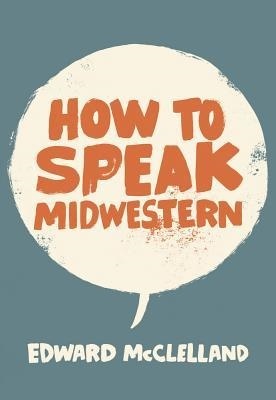 �� How to Speak Midwestern By Edward McClelland Belt Publishing Reviewed by Karl Wolff �� I'm a dictionary...
�� How to Speak Midwestern By Edward McClelland Belt Publishing Reviewed by Karl Wolff �� I'm a dictionary...
April 26, 2017
Tales from the Completist: "The Conspiracy Against the Human Race" and "My Work is Not Yet Done," by Thomas Ligotti
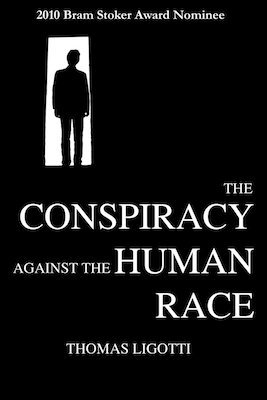 The Conspiracy Against the Human Race (2014) By Thomas Ligotti Reviewed by Jason Pettus
The Conspiracy Against the Human Race (2014) By Thomas Ligotti Reviewed by Jason Pettus 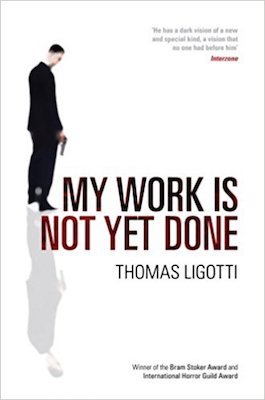 My Work is Not Yet Done...
My Work is Not Yet Done...
April 25, 2017
The CCLaP website's being redesigned from scratch! And we'd like your input!
Book Review: "Bridge of Words," by Esther Schor
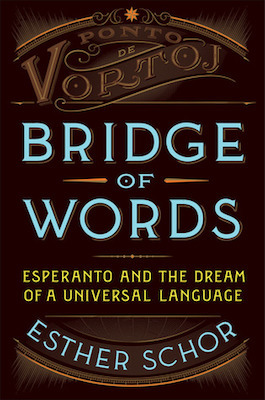 Bridge of Words: Esperanto and the Dream of a Universal Language By Esther Schor Metropolitan Books / Henry Holt and Company Reviewed by Jason Pettus I've long had a fascination for Esperanto, the "global second language" that got invented in the late Victorian Age, flourished among the far-left political parties of Early Modernism's Communist era, and had its last big hurrah among the hippies of the countercultural age. (For those who don't know, Esperanto was deliberately designed to be th...
Bridge of Words: Esperanto and the Dream of a Universal Language By Esther Schor Metropolitan Books / Henry Holt and Company Reviewed by Jason Pettus I've long had a fascination for Esperanto, the "global second language" that got invented in the late Victorian Age, flourished among the far-left political parties of Early Modernism's Communist era, and had its last big hurrah among the hippies of the countercultural age. (For those who don't know, Esperanto was deliberately designed to be th...
April 19, 2017
Book Review: "Chasing Utopia," by David Leach
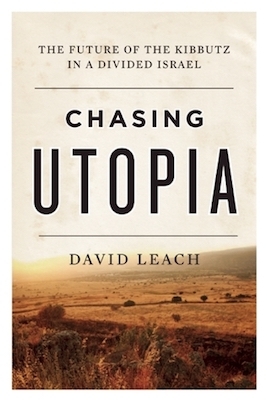 Chasing Utopia: The Future of the Kibbutz in a Divided Israel By David Leach ECW Press Reviewed by Jason Pettus It wasn't until publishing Kevin Haworth's 2012 essay collection Famous Drownings in Literary History that I learned for the first time about the Jewish institution known as the kibbutz, a concept that is part practical and part political; in reality not much more than a collectively owned farm in the style of '60s hippie communes, the part that's important to Judaism is that they...
Chasing Utopia: The Future of the Kibbutz in a Divided Israel By David Leach ECW Press Reviewed by Jason Pettus It wasn't until publishing Kevin Haworth's 2012 essay collection Famous Drownings in Literary History that I learned for the first time about the Jewish institution known as the kibbutz, a concept that is part practical and part political; in reality not much more than a collectively owned farm in the style of '60s hippie communes, the part that's important to Judaism is that they...
April 18, 2017
Book Review: "Ganja Yoga," by Dee Dussault
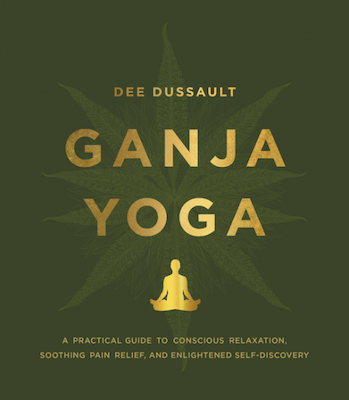 Ganja Yoga: A Practical Guide to Conscious Relaxation, Soothing Pain Relief, and Enlightened Self-Discovery By Dee Dussault HarperOne / HarperCollins Reviewed by Jason Pettus For the last two years I've been practicing yoga and meditation on a regular basis, first because I was required to as part of attending the computer-coding alternative school DevBootcamp, then afterwards because I found both practices to be positive and constructive ones in my life. And I've also been known to partake...
Ganja Yoga: A Practical Guide to Conscious Relaxation, Soothing Pain Relief, and Enlightened Self-Discovery By Dee Dussault HarperOne / HarperCollins Reviewed by Jason Pettus For the last two years I've been practicing yoga and meditation on a regular basis, first because I was required to as part of attending the computer-coding alternative school DevBootcamp, then afterwards because I found both practices to be positive and constructive ones in my life. And I've also been known to partake...
April 17, 2017
Book Review: "Huck Out West," by Robert Coover
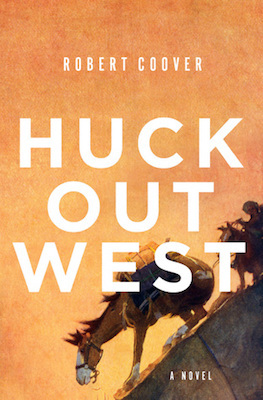 Huck Out West By Robert Coover W.W. Norton Reviewed by Jason Pettus For the first two-thirds of its running time, Robert Coover's new Huck Out West can only be called a perfect novel, which is why it came close to being the first book of the year to score a perfect 10 here at CCLaP. Or to be more specific, it succeeds perfectly at what it's aiming to do, which is to read and feel like a long-lost new chapter in the Tom Sawyer/Huckleberry Finn saga by Mark Twain, which to remind you consists...
Huck Out West By Robert Coover W.W. Norton Reviewed by Jason Pettus For the first two-thirds of its running time, Robert Coover's new Huck Out West can only be called a perfect novel, which is why it came close to being the first book of the year to score a perfect 10 here at CCLaP. Or to be more specific, it succeeds perfectly at what it's aiming to do, which is to read and feel like a long-lost new chapter in the Tom Sawyer/Huckleberry Finn saga by Mark Twain, which to remind you consists...
April 12, 2017
Book Review: "Lola," by Melissa Scrivner-Love
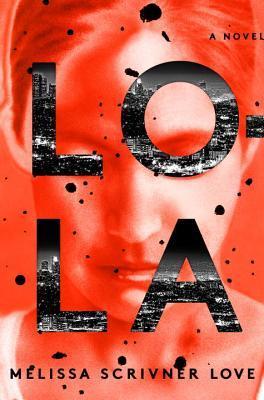 Lola By Melissa Scrivner-Love Crown Publishing Reviewed by Jason Pettus It's seeming more and more these days that a published genre novel is the new spec script in Hollywood, when it comes to those trying to get staff writing jobs on so-called "prestige TV" shows; and Melissa Scrivner Love's Lola is a perfect example of this, a book that feels for its entire running length like I'm reading a proposal for a new series to debut on FX this coming fall, which I was going to say is not necessari...
Lola By Melissa Scrivner-Love Crown Publishing Reviewed by Jason Pettus It's seeming more and more these days that a published genre novel is the new spec script in Hollywood, when it comes to those trying to get staff writing jobs on so-called "prestige TV" shows; and Melissa Scrivner Love's Lola is a perfect example of this, a book that feels for its entire running length like I'm reading a proposal for a new series to debut on FX this coming fall, which I was going to say is not necessari...



